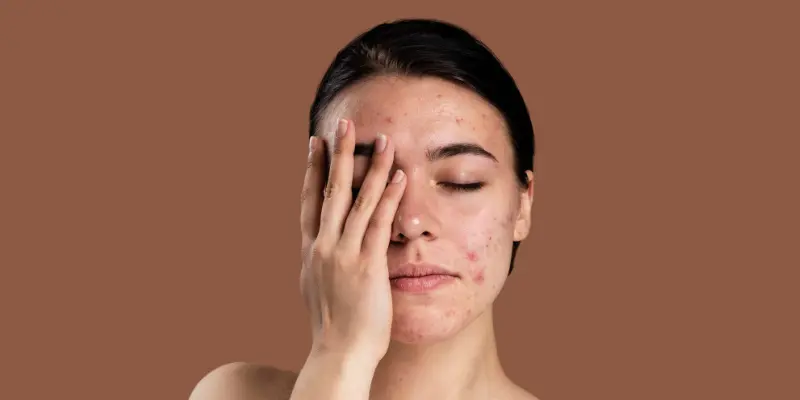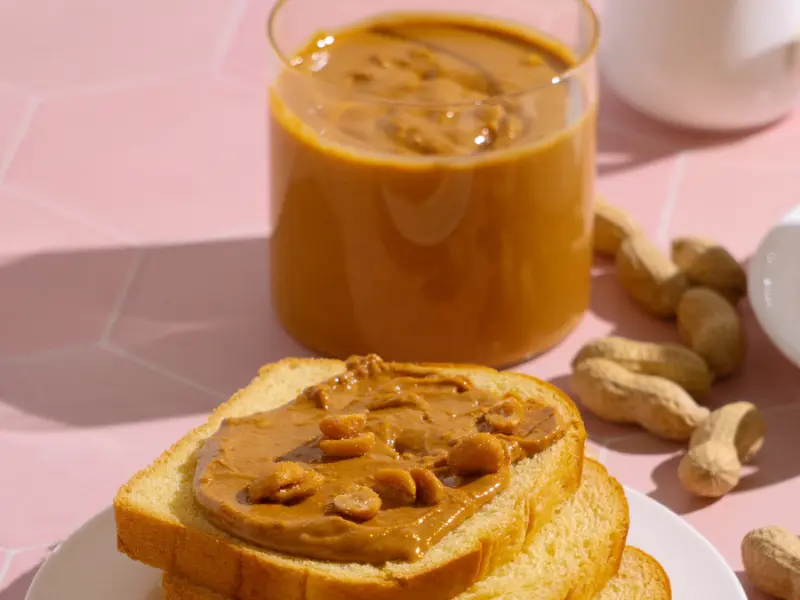Does Peanut Butter Cause Acne?
Published: 23 Mar 2025
You love peanut butter, but every time you eat it, do you notice new breakouts? Could this creamy spread really be the reason behind your acne? Some say yes, while others consider it’s just a myth.
So, what’s the truth? In this blog, we’ll explain the science, separate fact from fiction, and give you practical tips to keep your skin clear.
1- Does Science Support This Claim?
No strong studies confirm that peanut butter directly causes acne. However, some people may break out due to food intolerances or hormonal responses triggered by certain foods.
Acne is influenced by overall diet, including sugar intake, processed foods, and nutrient balance.

2- Peanut Butter and Acne: The Connection
Many people also relate acne to other foods, such as mangoes, bananas, spicy meals, rice, eggs, dairy, junk food or even almond milk.
Many people worry that peanut butter might trigger acne. While there’s no direct scientific proof, some ingredients in peanut butter could play a role in worsening breakouts.
- Omega-6 Fatty Acids: According to a study published in PubMed, peanut butter is high in omega-6 fats, which may promote inflammation. (1)
- Added Sugars & Oils: Many peanut butter brands contain hydrogenated oils and sugar, which can increase the insulin levels of your body and oil production, leading to clogged pores.
- Aflatoxins: Peanuts can be contaminated with aflatoxins, toxic compounds produced by certain mold notably Aspergillus flavus. (2)

| 3- Who Might Be More Prone to Acne from Peanut Butter? |
|---|
Don’t worry. Not everyone who eats peanut butter will experience breakouts, but certain people may be more sensitive to its effects.
|
| 4- Choosing the Right Peanut Butter for Clear Skin |
|---|
|
5- How can I prevent pimples after eating peanuts?
To prevent pimples after eating peanut butter:
- Drink plenty of water to flush out excess oils and toxins.
- Balance your diet with anti-inflammatory foods like leafy greens, berries, and omega-3-rich foods (salmon, flaxseeds).
- Wash your face if you’ve touched peanut butter to prevent clogged pores.
- Choose natural peanut butter without added sugars and hydrogenated oils, as these can worsen acne.
- Monitor your skin’s reaction and reduce intake if you notice frequent breakouts.
6- Conclusion
So guys, in this article, we’ve covered “Does peanut butter cause acne?” in detail. While peanut butter isn’t a guaranteed acne trigger for everyone, it contains omega-6 fats, added sugars, and oils that may contribute to breakouts in some people.
Personally, I recommend choosing natural, unsweetened peanut butter and monitoring how your skin reacts. If you notice flare-ups, try switching to alternatives like almond or cashew butter.
Found this helpful? Share it with a friend who’s scared of Peanut Butter.
7- FAQs
Peanut butter itself doesn’t directly cause acne, but some ingredients in it—like added sugars, hydrogenated oils, and excess omega-6 fatty acids—may contribute to breakouts. Acne is complex and depends on factors like diet, hormones, and skincare. If you notice breakouts after eating peanut butter, try switching to a natural version without additives.
Yes, peanut butter contains omega-6 fatty acids, which, in excess, can promote inflammation in the body. Since inflammation plays a role in acne, consuming too much peanut butter might worsen skin issues for some people. However, balancing it with omega-3-rich foods like fish or walnuts can help counteract this effect.
Peanut butter isn’t necessarily bad for your skin, but certain processed versions with added sugar, oils, and preservatives can trigger breakouts. Some people may also be sensitive to peanuts, leading to skin reactions. Choosing natural peanut butter with no additives and eating it in moderation is a better option.
If you’re prone to cystic acne, peanut butter might be a trigger due to its omega-6 content, potential allergens, and inflammatory properties. Some people with acne-prone skin find that cutting back on peanuts helps reduce deep, painful breakouts. However, individual responses vary, so it’s best to monitor how your skin reacts.
Peanut butter has healthy fats and vitamin E, which can nourish the skin and support a healthy glow. However, eating too much—especially processed versions with additives—can cause inflammation and breakouts. If you tolerate it well, a small amount of natural peanut butter can be part of a balanced diet for healthy skin.
While peanut butter is rich in healthy fats, it’s not the best option for skincare. Its thick, oily texture can clog pores and potentially cause breakouts. If you’re looking for a natural face mask, ingredients like honey, yoghurt, or aloe vera are better alternatives.
Yes! If peanut butter seems to trigger your acne, try almond butter, cashew butter, or sunflower seed butter. These alternatives are often lower in omega-6 and may be easier on sensitive skin.
The best way to find out is by eliminating peanut butter from your diet for a few weeks and tracking your skin’s response. If your acne improves, peanuts might be a trigger for you. Reintroduce it slowly to see if breakouts return.
Moderation is key! One to two tablespoons of natural peanut butter per day is usually safe for most people. If you notice breakouts, try cutting back and balancing your diet with more anti-inflammatory foods.
8- References For Further Readings
At MedicaWire, all medically sensitive content is reviewed by licensed healthcare professionals. Our team ensures that the information you read is accurate, up-to-date, and based on trusted medical sources.
Learn how we maintain high standards by reading our Editorial Policy.
📚 Sources
- Does peanut butter cause acne? Everything to know– Medical News Today
- Smith, R. N., Mann, N. J., Braue, A., Makelainen, H., & Varigos, G. A. (2007).
The effect of a high-protein, low glycemic-load diet on acne vulgaris: A randomized controlled trial.- Pubmed.ncbi.nlm.nih.gov - Burris, J., Rietkerk, W., & Woolf, K. (2016).
Acne: The Role of Medical Nutrition Therapy. –Pubmed.ncbi.nlm.nih.gov
ℹ️ Our Promise
MedicaWire follows strict sourcing guidelines and only references peer-reviewed studies, academic institutions, and reputable medical associations. We update content regularly to reflect new health information.

- Be Respectful
- Stay Relevant
- Stay Positive
- True Feedback
- Encourage Discussion
- Avoid Spamming
- No Fake News
- Don't Copy-Paste
- No Personal Attacks



- Be Respectful
- Stay Relevant
- Stay Positive
- True Feedback
- Encourage Discussion
- Avoid Spamming
- No Fake News
- Don't Copy-Paste
- No Personal Attacks




